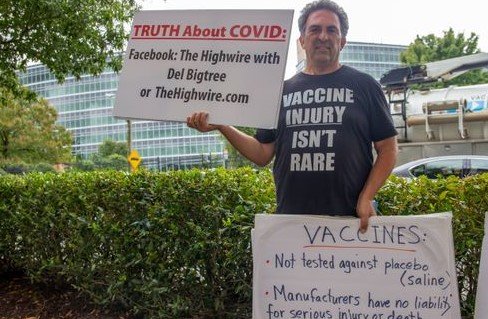A fired-up crowd outside CDC headquarters. Legal threats from the state’s top prosecutor. And a community divided over school safety costs. This week in Georgia has been anything but calm.
The political heat around public health policy, protest rights, and education funding is ramping up fast — and Georgians are in the thick of it.
CDC Staff and Supporters Protest Vaccine Panel Overhaul
Dozens gathered outside the CDC campus in Atlanta after the Trump administration’s abrupt restructuring of a key vaccine advisory panel sparked outrage across the public health community.
Among the crowd were former and current CDC employees — some speaking out despite risks to their careers.
One CDC doctor, identified only as Anna for fear of retaliation, summed it up: “The first thing that happens is chaos.” She was referring to the fallout from internal directives last week that ordered staff to strip certain COVID vaccine guidelines from official channels without scientific review.
The breaking point came Monday, when the Advisory Committee on Immunization Practices — long regarded as the gold standard in vaccine safety recommendations — was effectively dismantled.
Cathy Cavallaro, who retired after years at the CDC, didn’t mince words. “It’s a travesty,” she said. “Doctors, especially pediatricians, rely on this committee to make decisions that affect real lives.”

State AG Turns Up the Heat With Stark Warning to Protesters
As if the protests weren’t tense enough, Georgia Attorney General Chris Carr issued a blunt warning that has civil rights groups worried.
Speaking at a press conference late Tuesday, Carr said future protesters engaging in violence or vandalism could face domestic terrorism charges — a label that would carry severe criminal penalties.
“If you earn it, you’ll get it,” Carr said, refusing to walk back the implication that the state will come down hard on what he called “agitators.”
This isn’t the first time Georgia officials have used the domestic terrorism statute. Several protesters arrested during the “Cop City” demonstrations earlier in the year were charged under the same law — though critics argue the charges were excessive and politically motivated.
Here’s the state’s statute and related charges since 2020:
| Year | Protest Incident | Domestic Terrorism Charges Filed | Outcomes |
|---|---|---|---|
| 2020 | Atlanta Racial Justice Protests | 3 | 1 dismissed, 2 ongoing |
| 2023 | Cop City Forest Encampment | 16 | 5 dropped, 11 pending trial |
| 2025 | (Potentially) CDC Policy Protest | TBD | TBD |
Advocates with the ACLU of Georgia say the trend is alarming. “The AG’s rhetoric chills lawful protest,” said legal director Cory Isaacson. “Peaceful dissent is not terrorism.”
Barrow County’s School Safety Debate Turns Bitter
While tensions rise in Atlanta, about an hour northeast, a fight over money is simmering in Barrow County. At the center of the clash: who should fund school resource officers (SROs) — the county or the school district?
The issue flared after school officials asked the county government to continue covering a larger share of the cost for on-campus officers. The county pushed back, pointing to strained budgets and rising expenses across departments.
Parents like Charity Lee are furious the funding is even in question. “After officers saved lives in our school, you’re asking whether it’s worth it?” she asked during a heated meeting. “Could you be more callous?”
School leaders say they’re worried that shifting costs could mean fewer officers on campus.
• In 2023, the county covered 80% of SRO salaries
• For 2024-2025, officials proposed lowering that to 50%
• The school district says it can’t afford the difference without cutting other safety programs
Some school board members have floated the idea of reallocating federal safety grants, but it’s unclear if those funds will be enough.
Local Tensions Reflect Bigger National Fights
The week’s headlines aren’t isolated events. They’re reflective of a broader collision between state power, federal health policy, and community-level decision-making.
Georgia — with its mix of deep-red rural politics and a rapidly growing progressive base in metro areas — is once again in the national spotlight. What happens in Atlanta and Barrow County could foreshadow battles elsewhere.
In the CDC case, the power struggle over vaccine messaging has echoes across the country. Trump’s push to tighten political control over scientific agencies is already being mirrored in other states.
As for the AG’s protest threat, Georgia isn’t alone. Florida and Texas have passed or expanded anti-riot laws, and federal lawmakers have debated tightening protest-related criminal statutes.
Meanwhile, local funding fights like the one in Barrow County highlight the unresolved questions over how much schools — and the officers who patrol them — should cost, and who should pick up the bill.
A State on Edge, With No Easy Answers
Each of these issues — public health trust, protest rights, school safety — stirs emotions and divides communities. But taken together, they also paint a picture of a state wrestling with its identity.
Is Georgia leaning into more aggressive criminal prosecution of dissent? Is the federal government’s influence in question at its own Atlanta-based health agency? And how do smaller counties balance their budgets when lives — and politics — are on the line?
One protester outside the CDC campus summed up the moment with a sigh: “It feels like we’re fighting three fights at once. And none of them are fair.”
